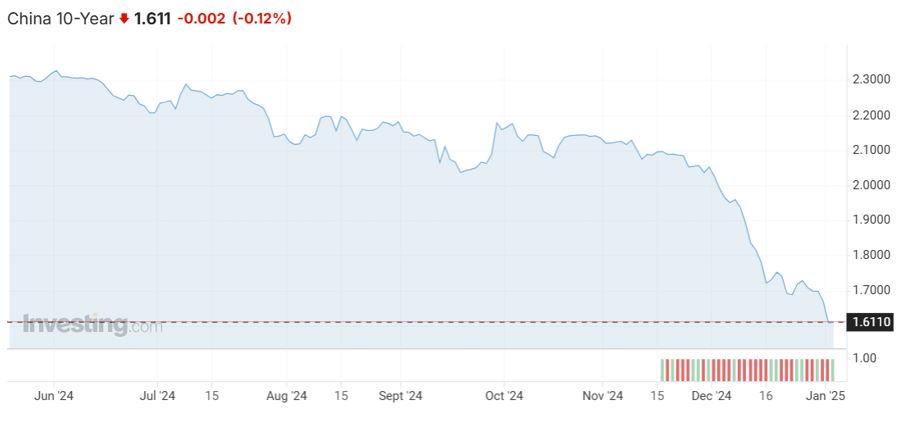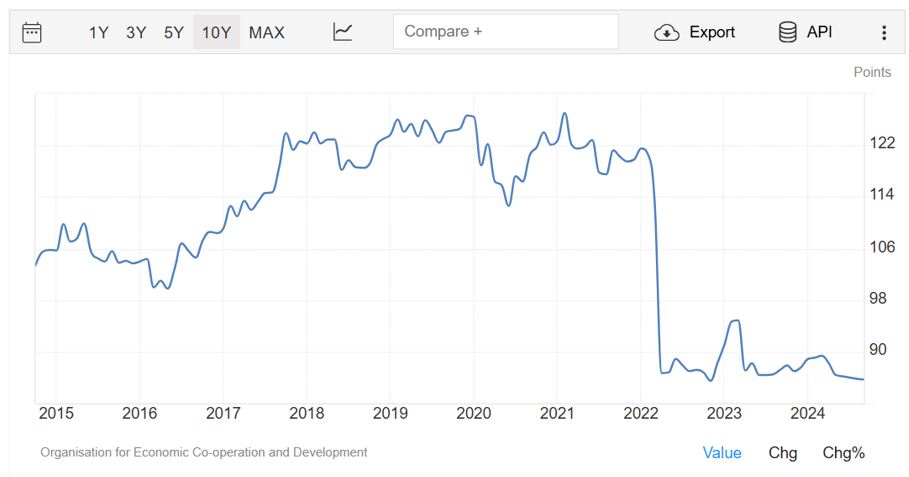Falling Chinese bond yields in recent weeks suggest that gold demand in China will remain high in the coming years, especially as gold shows a bullish structure on the chart.
Falling Chinese bond yields have been central in recent days and weeks – in the news:
The decline in bond yields, which has left 10- and 30-year yields at record lows, is due to rising demand for bonds, which are a safe haven.
Crashing yields on Chinese bonds
As more market participants buy bonds, the price of the bond is pushed higher, causing yields to fall by default.
RELATED – A Must-See 50 Year Gold Price Chart
Falling yields are due to increased demand for bonds, and this typically happens when the economic outlook is poor, hence the “light security” trade.
Why would Chinese investors rush to a safe haven like bonds and by extension gold?


Between 2014-2024, China contributed 30.9% to global economic growthbetter than India (16.1%) and the US (9%). Recent economic challenges have had significant consequences weakened this economic growth path. Part of China’s growth has been its massive infrastructure projects, which have proven to be an effective economic engine in the short term, but have become a drag on the economy in the longer term due to the overcapacity created by building too much too quickly.
Consumer confidence is crashing
China, bucking the trend of Western economies, has seen some months of deflation recently with an overall inflation rate of 0.2% at the end of 2024. While deflation is good for consumers, it leads to lower incomes for companies, which then have to spend a greater share of their turnover on paying down debt, which will have an impact on future investments and profitability for these companies. Lower asset prices, such as real estate, can impact economic sentiment as households see their wealth decline due to a lower housing market.
Fewer real estate prices and land sales have exacerbated local government revenue problems as they see lower incomes on which they depend to repay their debts. Consumer confidence in China has failed to recover from aggressive lockdowns, leaving confidence at very low levels since 2022 with no immediate sign of recovery.
Importantly, when households are pessimistic about the future, they respond accordingly save more of their income instead of spending it. This has two obvious consequences: first, less spending leads to lower business sales, which compounds the problem of low growth and low confidence. Second, households will most likely choose to dip their savings into the bailout of physical gold, which in turn will lead to increased demand for gold in China.


Gold and the risky trade
This is the first tailwind for the gold market as consumers fear for their economic future, their savings rates are increasing and much of that excessive saving will be channeled into physical gold purchases.
RELATED – Gold Prediction 2025
Moreover, on a larger scale, there are clear indications of Chinese state concerns about public finances, as British export data show that the People’s Bank of China secretly bought gold during the reported six-month gold buying pause in late 2024. Perhaps the purchases were made in secret because the government did not want to increase public anxiety at a time of low confidence and panic.
While the Chinese state buying gold is likely a de-dollarization strategy, it could also be a sign that the Chinese state is concerned about their economy and may want to stockpile gold in case they need to increase the value of the yuan in the future defend.
There is a lot of demand for savings ports in China
The second boost to demand for the gold market comes from the signal of falling bond yields. Investors flock to the safety of the bond markets when future economic prospects deteriorate.
This is a clear sign that economic conditions in China and during these periods will deteriorate. Risky assets such as real estate and stocks are generally out of favor; risky safe havens such as bonds are doing very well. If Chinese bond investors are right about what they expect from the Chinese economy, this will only strengthen local demand for gold.
Considered by analysts as the ultimate safe haven, gold is positioned to see further capital flows from Chinese institutions and private investors looking for a recession-proof asset to store their wealth.
Gold trades close to ATH in all major currencies. However, it is unlikely that Chinese consumers will see a better asset to protect them from any negative impact of the Chinese economy.
Lower returns, lower opportunity costs
The third boost to the gold price is that lower interest rates reduce the risk-free return on savings accounts. Will less interest be paid for these types of investments; gold will be a beneficiary.
The biggest risk to the gold price is the positive real interest rate. This is less likely as interest rates fall. By purchasing gold bullion, lower interest payments will ensure that the opportunity cost of holding gold bullion is low. This in turn promotes buying gold.
Written by Levi Donohoe.
Final edit by Taki Tsaklanos.

